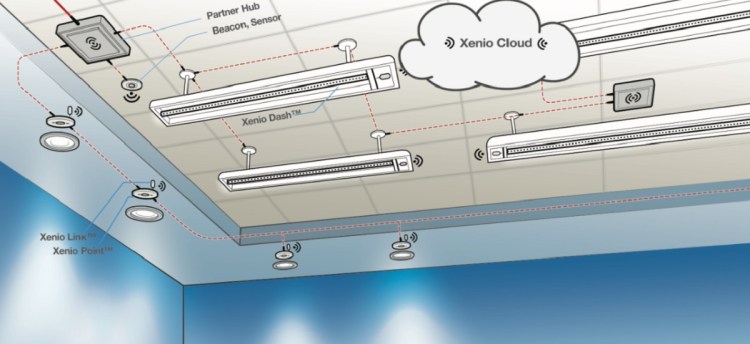Light-emitting diode (LED) lighting company Bridgelux is spinning out smart lighting startup Xenio Systems, which has raised an undisclosed amount of venture capital funding.
San Francisco-based Xenio wants to use smart lighting to bring to life applications like the retail kiosk that recognizes Tom Cruise in the film Minority Report. It wants to move the Internet of Things, or making everyday objects smart and connected, to a new generation through smart lighting. Investors include DCM Ventures, El Dorado Ventures, and VantagePoint Capital Partners
The company believes it can accelerate the deployment of the Internet of Things by embedding its cloud-based solution into Bridgelux’s smart lights, which are controlled via internet apps. Xenio uses those lights as beacons that can discover who is nearby and beam location-based promotional messages to the passersby. Xenio collects data through a two-way communications loop with smartphone users, and it provides them with targeted marketing messages from the businesses the customers are already visiting.
Xenio has 59 technology patents and a global sales channel via Bridgelux. Xenio’s first product delivers beacon-like capability without the need for businesses to install anything except the smart lights that they’re already buying to save energy. The U.S. Department of Energy hopes consumers and businesses will save about $12.5 billion through smart lighting.
Xenio (pronounced Zen-ee-oh) has a running start to capture the emerging commercial IoT space, which has not taken off as quickly as many predicted. Xenio is targeting the product at indoor commercial spaces like retail stores, hospitals, airports, and offices. Instead of individual beacon hardware that’s costly to install, Xenio taps the infrastructure of the smart lights and adds its Xenio cloud, software development kit (SDK), and apps.
The company said it has begun to gain traction from big-box retailers seeking to reinvent themselves. “Brick and mortar” spaces are reinvigorating themselves by adding in-store navigation services, launching proximity-based marketing that adds informative value, and helping shoppers get service in stores when they need it. Other vertical market uses include health care monitoring in hospitals, people tracking to optimize physical office space, and environmental sensing.
As of today, Xenio is an independent company with almost 20 employees. Rivals include older lighting companies such as Acuity Brands, General Electric, and Philips. There are other smart module startups like Gooee, Stack, and Xicato that more directly compete with Xenio, but they’re not as focused on Xenio’s key vertical markets (e.g. retail and hospitality).
IoT pioneer Reza Raji has been appointed CEO of Xenio Systems. Mark Teitell, interim Xenio CEO, is no longer part of the company. Philip Lavee will be Xenio’s senior vice president of sales and market development; he was formerly vice president of strategic sales at Bridgelux.
Bridgelux’s new parent company, Kaistar Electronic, a Shenzhen, China-based technology company, is also a strategic manufacturing partner for Xenio hardware. Kaistar is owned by China Electronics Company (CEC), a multibillion-dollar manufacturer of electronics products.
Correction, 10:15 a.m. Pacific: El Dorado Ventures, not Rembrandt Venture Partners, is one of the backers. The press release stated the wrong information.
VentureBeat's mission is to be a digital town square for technical decision-makers to gain knowledge about transformative enterprise technology and transact. Learn More

